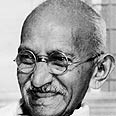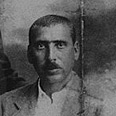

According to the Telegraph, the book alleges Ghandi was in love with German-Jewish architect and bodybuilder, Hermann Kallenbach, for whom he left his wife in 1908.
It also claims that as an older man he held "nightly cuddles" – without clothes - with seventeen year-old girls, including his own niece.
"Gandhi wrote to Kallenbach about 'how completely you have taken possession of my body. This is slavery with a vengeance'," the book said. It is also claimed that Ghandi nicknamed himself "Upper House" and Kallenbach "Lower House."

Ghandi (L) with Kallenbach (R) and an unidentified woman (Photo: The Daily Mail)
According to the Daily Mail, Kallenbach was born in Germany but emigrated to South Africa where he became a wealthy architect. He lived with Ghandi for two years in a house he built in South Africa.
The two were forced to separate in 1914 when Ghandi returned to India and Kallenbach was denied entry to the country because of World War I. They stayed in touch by letter.
As late as 1933 Ghandi wrote to Kallenbach telling of his unending desire and branding his ex-wife "the most venomous woman I have met," the Daily Mail reported.
The book details 70-year-old Ghandi's complex relationship with his 17-year-old great niece Manu, with whom he slept with regularly. "I cannot imagine a thing as ugly as the intercourse of men and women," he once told Kallenbach.
The book also claims the Indian leader held racist views against South African blacks.
"We were marched off to a prison intended for Kaffirs," he is quoted as saying during a visit to the country. "We could understand not being classed with whites, but to be placed on the same level as the Natives seemed too much to put up with. Kaffirs are as a rule uncivilized."
The Wall Street Journal's review states the book depicts Gandhi as "a sexual weirdo, a political incompetent, a fanatical faddist, implacably racist, and a ceaseless self-promoter, professing his love for mankind as a concept while actually despising people as individuals."
The New York Times praised the book. "Lelyveld is especially qualified to write about Gandhi’s career on both sides of the Indian Ocean: he covered South Africa for The New York, and spent several years in the late 1960s reporting from India. He brings to his subject a reporter’s healthy skepticism," the paper said.
- Follow Ynetnews on Facebook















